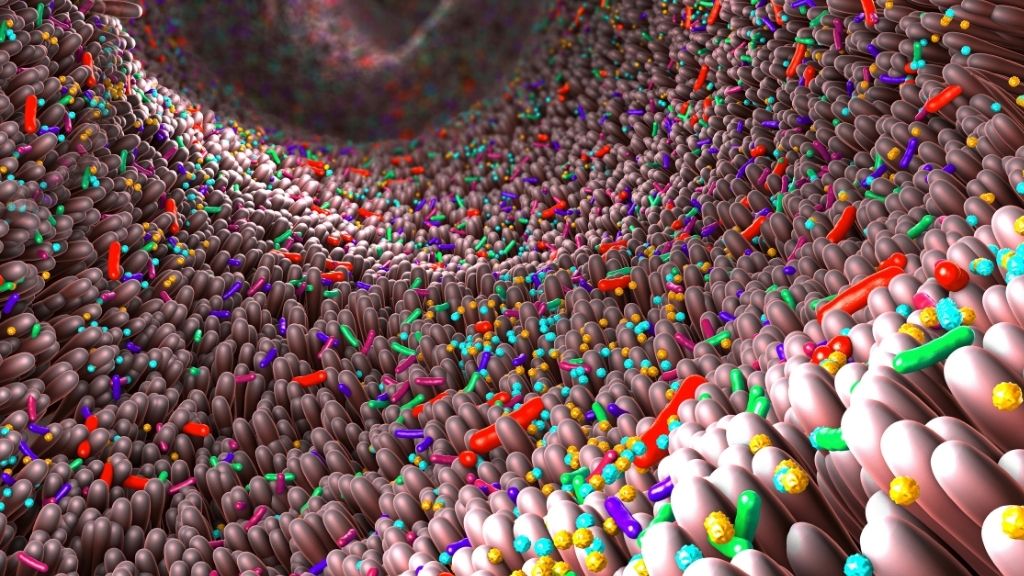Tweaking the gut bacteria of malnourished kids could help them grow

Get the world’s most fascinating discoveries delivered straight to your inbox.
You are now subscribed
Your newsletter sign-up was successful
Want to add more newsletters?

Delivered Daily
Daily Newsletter
Sign up for the latest discoveries, groundbreaking research and fascinating breakthroughs that impact you and the wider world direct to your inbox.

Once a week
Life's Little Mysteries
Feed your curiosity with an exclusive mystery every week, solved with science and delivered direct to your inbox before it's seen anywhere else.

Once a week
How It Works
Sign up to our free science & technology newsletter for your weekly fix of fascinating articles, quick quizzes, amazing images, and more

Delivered daily
Space.com Newsletter
Breaking space news, the latest updates on rocket launches, skywatching events and more!

Once a month
Watch This Space
Sign up to our monthly entertainment newsletter to keep up with all our coverage of the latest sci-fi and space movies, tv shows, games and books.

Once a week
Night Sky This Week
Discover this week's must-see night sky events, moon phases, and stunning astrophotos. Sign up for our skywatching newsletter and explore the universe with us!
Join the club
Get full access to premium articles, exclusive features and a growing list of member rewards.
We carry myriad types of bacteria in our guts, but in malnourished children, many helpful gut microbes lack the fuel to grow. Now, a clinical trial suggests that a new dietary supplement could help restore the gut bacteria of malnourished kids, helping them to gain weight and grow up healthy.
The trial took place in the Mirpur district of Dhaka, Bangladesh, and the researchers created the new dietary supplement from locally available ingredients, including chickpeas, soy flour, peanuts, green bananas, oil and sugar. Compared with children given a standard treatment for malnutrition — a calorie-dense "ready-to-use supplementary food" (RUSF) — children given the new supplement put on weight and gained height at a faster rate.
What's more, fecal samples from these children showed that their gut bacteria better matched those of healthy kids by the end of the trial. This change in gut microbes was linked to the appearance of certain proteins in the blood; in particular, key proteins involved in bone growth and brain development increased, while markers of inflammation decreased, according to the study, which was published April 22 in the The New England Journal of Medicine.
Related: 5 ways gut bacteria affect your health
These findings hint that "the influence of the [microbial] community reaches well beyond the wall of the gut to influence many systems," said senior author Dr. Jeffrey Gordon, director of the Edison Family Center for Genome Sciences and Systems Biology at the Washington University School of Medicine in St. Louis.
Remarkably, the standard RUSF treatment contains about 20% more calories than the new supplement, and yet, "this intervention with a lower calorie density can actually improve weight gain in these kids to a greater extent than something with a higher calorie density," said Ruairi Robertson, a postdoctoral research fellow who studies the gut microbiome at Queen Mary University of London but was not involved in the study. This result turns the usual thinking around nutrition and calorie intake on its head and highlights the importance of gut bugs in child development, he said.
That said, more data is needed to confirm whether the supplement helps children grow in the long term and whether the observed changes in protein levels actually translate to strong bones and healthy brains, Robertson said. For now, the researchers don't know how long the observed benefits will last or if the treatment can offer similar benefits to all malnourished kids, Gordon said.
Get the world’s most fascinating discoveries delivered straight to your inbox.
"There's much work to do, but the results, I think, are encouraging," Gordon told Live Science.
The best fuel for gut bugs
Leading up to the clinical trial, Gordon and his colleagues conducted exhaustive studies of human fecal samples, as well as laboratory studies of mice and pigs, to pin down which foods might supply the best fuel for a malnourished child's gut microbiome, the community of microbes that lives in the digestive system.
The team first sampled fecal matter from children in different countries — including Venezuela, Malawi, the U.S. and Bangladesh — and looked for patterns in how their gut bacteria varied, depending on their location, age, diet and nutrition status. They noted that healthy children accumulated a particular set of gut microbes during the first two years of life, while the gut microbiomes of undernourished children appeared "stunted."
In other words, similar to organs in the body, the gut microbiome matures and changes through time, but the microbiomes of undernourished children "look 'younger' than you would expect," Gordon said.
"After the age of about two or three, the gut microbiome stabilizes, and it looks quite similar to that of an adult," Robertson said. "We hypothesize that if you have these disturbances ... in that critical window, that can actually disturb the trajectories later on," in terms of how the child's body matures.
Related: 70,000 never-before-seen viruses found in the human gut
To see how having the microbiome stuck in this immature state might undermine a child's development, the team tested the idea in mice. Sure enough, when the team transplanted malnourished children's fecal samples into animals, their rate of weight gain and bone growth took a turn for the worse. They also began to develop metabolic dysfunction, as for example, the body began breaking down amino acids for energy rather than sugars, among other issues seen in malnourished kids.
The team wondered if certain foods could repair the stunted microbiome and potentially help put kids back on track for normal development. Working with locally available foods from Dhaka, the team tested how different combinations of ingredients affected the gut microbiome in their animal models and how these changes correlated with growth.
By working with locally available foods, "ideally, this is an intervention now, which can be produced locally and provided locally," and aligns with local cultural standards, Robertson said. "And that kind of creates a sustainable model for a good outcome overall."
Seeing hopeful results in their animal studies, the researchers ran a small trial of their new food supplements in children, testing out three formulations. Of these, one stood out as particularly promising and worthy of a larger trial.
Put to the test
In the current study, 118 children with moderate acute malnutrition completed the trial, and their ages ranged from 12 months to 18 months old. (By definition, children with moderate acute malnutrition fall two to three standard deviations below the average weight for their height, whereas those with severe acute malnutrition fall at least three below, according to the World Health Organization.)
Half of the children received RUSF, while the other half received the new dietary supplement, called a "microbiota-directed complementary food prototype" (MDCF). The RUSF used in the trial also contained local ingredients — mostly rice and lentils — but these foods weren't specifically selected to nourish the gut microbiome, as in the new MDCF, said first author Robert Chen, a medical and doctoral student in Gordon's lab. And that seemed to make all the difference, he added.
The children received their assigned supplement twice daily for three months and then underwent another month of follow-up. The researchers measured the children's weights, lengths and arm circumferences, tracking changes through time, and found that kids given MDCF grew and gained weight faster.
"That point certainly was very surprising to us," Chen said.
That said, while the improvements in weight and height were significant, they were relatively small overall, Robertson said. That may be related to the fact that the children were moderately malnourished, whereas the same treatment in severely malnourished kids "might actually have more drastic effects," he said. In any case, "we can't ever expect to see a complete recovery over the course of three months," he added.
Related: 5 diets that fight diseases
The team also collected blood samples, to assess proteins in the children's plasma, and fecal samples, to analyze their gut bacteria. Kids given the new supplement showed greater increases in 70 plasma proteins related to development than kids given the RUSF; these included key proteins for bone growth and nerve and brain development. Increases in these 70 proteins were correlated with significant weight and height gains.
While interesting, fluctuating protein levels can't definitively indicate whether these children will grow healthy bones and brains; larger and longer clinical trials will be needed to see how these protein levels translate to actual health outcomes, Robertson said. But by pinpointing proteins of interest, the current study provides a "treasure trove for other researchers to delve into," he said.
Similarly, across all of the children, the team identified 21 types of bacteria that appeared to be linked to significant growth gains, as well as two types of bacteria associated with poor growth. These latter two bacteria included Escherichia coli and a Bifidobacterium species, a probiotic found in high quantities in breastfed infants.
"You want loads of it there in the very early months of life, because it breaks down and metabolizes the sugars, these human milk oligosaccharides, in breast milk," Robertson said. "But intriguingly, [the trial] seemed to show that, later on, having more of it was negatively associated with growth," he said. So perhaps, in this critical stage of infancy when children are weaned off breast milk, this once-beneficial gut bug should become less abundant, allowing other microbes to take its place, he said.
Seeing that their new MDCF helped push kids' microbiomes into a more mature state, Gordon and his team are now monitoring the children to see how they grow through time. In the future, the researchers want to better connect the dots between kids' diets, their gut bacteria, their plasma proteins and their health outcomes.
These fine details should help the scientists adapt their MDCF to meet the needs of children in different places, where the supplement may need to be made from different ingredients.
Originally published on Live Science.

Nicoletta Lanese is the health channel editor at Live Science and was previously a news editor and staff writer at the site. She holds a graduate certificate in science communication from UC Santa Cruz and degrees in neuroscience and dance from the University of Florida. Her work has appeared in The Scientist, Science News, the Mercury News, Mongabay and Stanford Medicine Magazine, among other outlets. Based in NYC, she also remains heavily involved in dance and performs in local choreographers' work.
 Live Science Plus
Live Science Plus










